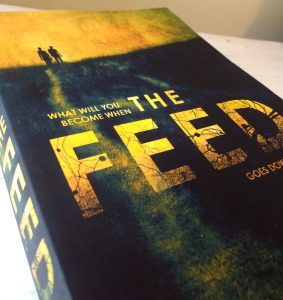What’s the weirdest place you’ve ever checked your social media? On a mountain top with an incredible view? In a meeting? In the bathroom while brushing your teeth? When you’re supposed to be talking to a real live person right there in front of you?
If you tick no to all these then congratulations, you are a wholesome human being and I envy you, because I am unashamedly hooked. My life and routine are such now that I don’t get many moments to myself and if I do, the quickest easiest way to entertain myself it just to check up on what everybody else is doing.
the Feed goes down and civilisation comes to an end
In the Nick Clark Windo’s The Feed, society has taken this to the next level. The Internet has jumped out of our phones and is in our heads – no screens, no keyboards, just a constant stream of knowledge, chatter, sponsored content and the real gut feelings of our nearest and dearest.
The whole world is using it – crowded restaurants are silent because everyone is interacting online, you witness a crime being committed and the Feed tells you where you can buy the attacker’s trainers, nobody can read any more because information is delivered straight to the brain.
But then a series of mysterious assassinations and terror plots begin and, one terrible night, the Feed goes down and civilisation comes to an end. Many people die from the shock – the author compares it to a sudden lobotomy.
 This is a fantastic Black Mirror-esque idea for a tale and the hook dragged me in straight away, but at first I did find the book a little frustrating. I wanted to know more about the Feed and the mysterious Taken people and less about the post-apocalyptic mess which followed its collapse. And I couldn’t quite warm to Tom and Kate, the nice middle class couple caught up in it all as they search the countryside looking for their missing daughter. I also didn’t truly buy into the idea that almost everyone on the entire planet – rich and poor, developing and developed world – had the feed in their brains. What about the underclass who could never afford it – they’d really come out on top in this world… But that’s probably another story.
This is a fantastic Black Mirror-esque idea for a tale and the hook dragged me in straight away, but at first I did find the book a little frustrating. I wanted to know more about the Feed and the mysterious Taken people and less about the post-apocalyptic mess which followed its collapse. And I couldn’t quite warm to Tom and Kate, the nice middle class couple caught up in it all as they search the countryside looking for their missing daughter. I also didn’t truly buy into the idea that almost everyone on the entire planet – rich and poor, developing and developed world – had the feed in their brains. What about the underclass who could never afford it – they’d really come out on top in this world… But that’s probably another story.
It’s a fantastic Black Mirroresque idea
Then on page 183 (of my copy) something happens which made me go oohhhh… then I started racing through it. The characters have more depth then, more potential for pain and growth. And there at last were the glimpses of what went wrong with society and the explanation was more imaginative and fantastical (but plausible) than I could have suspected. A genuine surprise twist which, when you look back, is actually very nicely set up without leaving any obvious giveaways. That sort of thing is hard to find these days.
And through the paciness and the fight to survive in the ruins of society there is some real stuff to think about here. The Feed sounds like a horrifying thing but it has its good side too – the joy of sharing and communicating with the entire world, the strength of having so much knowledge right there in your head. These days it’s almost accepted without question that social media is a menace, it’s addictive, it’s taking people’s heads out of the real world. But it does good things too. People find their tribes – cosplayers, knitting addicts, soap fans. And for some people, like those struggling with racism, homophobia or transphobia in their own offline communities, going online and knowing they’re not alone is a huge source of strength.
Like the Internet we know and love/hate, The Feed a mixed bag. And it’s definitely something to think about next time I check my Facebook updates under the covers at 6.30am.
